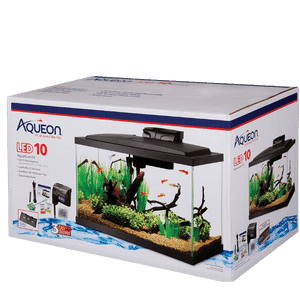Do Betta Fish Need Light? How to Perfect Your Pet's Environment
Do Betta Fish Need Light? Learn the critical role lighting plays in their well-being and how to get it right. Dive in to Master the art of lighting and get useful insights and strategies!
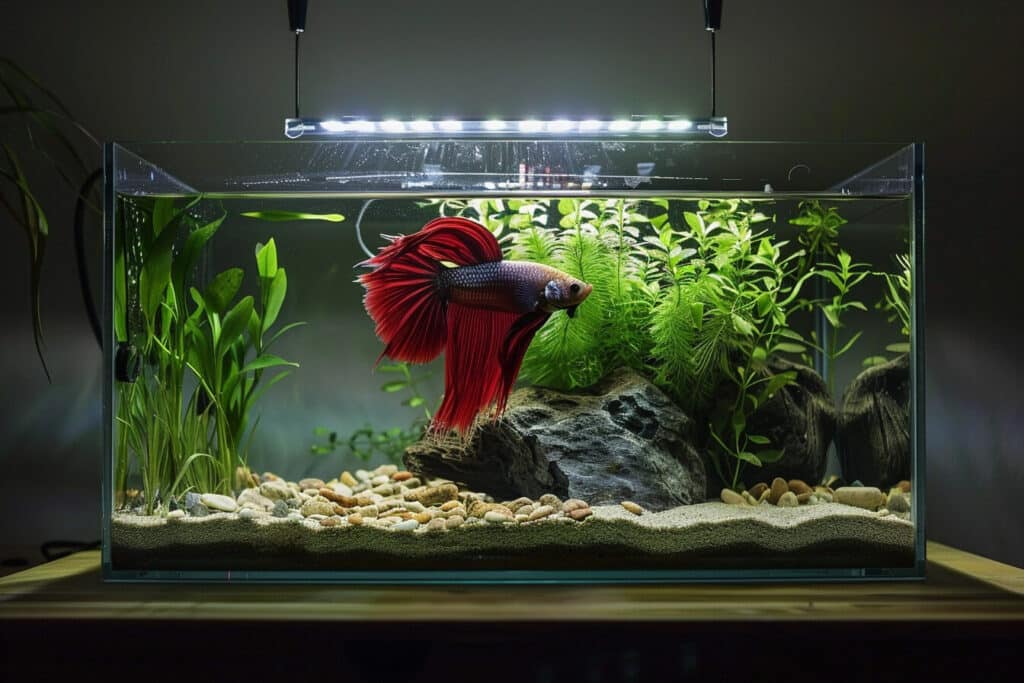
When it comes to creating the perfect habitat for your betta fish, one question frequently bubbles to the surface: “Do betta fish need light?” It’s a simple query, yet the answer plays a crucial role in the well-being of these vibrant and spirited creatures.
Light affects not just how we see our bettas, but also influences their health, mood, and daily rhythms. Understanding the significance of Betta lighting is Important.
Stay with us as we illuminate the essentials of betta fish lighting, exploring everything from the natural vs. artificial light debate to establishing a healthy light cycle that mirrors the rhythm of a betta’s day. We’re here to ensure that every flick of the switch contributes to a happier, healthier betta.
Table of Contents 🦑
The Betta Fish Natural Light Conditions in the Nature
Betta fish originate from the warm, shallow waters of Southeast Asia, where they live in environments like marshes, rice paddies, and slow-moving streams. These natural habitats are shaded and filtered by dense vegetation, providing bettas with soft and dappled lighting conditions. This natural setting, with its indirect light, is crucial for their health, influencing everything from their vibrant colors to their daily rhythms.
When we bring betta fish into our homes and captivity, we must strive to replicate these conditions to the best of our ability.
Lighting in a betta fish tank isn’t just about making our aquatic pets visible or enhancing the aesthetic appeal of our aquariums, it’s about mimicking the natural light cycles and conditions of their original habitats. Proper lighting supports the physiological needs of betta fish, promoting natural behaviors and reducing stress.

Betta Fish Lighting Needs, Why Does it Matter?
Grasping the importance of lighting for betta fish extends beyond mere decoration. It’s a crucial aspect of their care that significantly influences their well-being. Proper lighting affects not just their physical health but also their mood and behavior. But to fully cater to these needs, one must understand the betta fish light cycle and its impact on these captivating pets.
Betta Fish Light Cycle, How Much Light Does a Betta Fish Need?
The light cycle for betta fish is a key element of their care, reflecting the balance between day and night that they would experience in the wild. So, what’s the ideal amount of light for betta fish? Let’s dive into their daily light requirements and the importance of a regular cycle.
Betta Fish Daytime Light Schedule
Active by day and resting by night, betta fish’s diurnal nature means they thrive under conditions that mimic the natural light of their tropical habitats. Providing around 12 to 14 hours of light each day simulates these conditions, supporting their health and encouraging natural behaviors like feeding and exploring. This light not only brightens their day but also plays a crucial role in maintaining their vibrant colors and vitality.
Do Betta Fish Need Light at Night?
The answer is YES, equally important to their well-being is the night phase, where about 10 to 12 hours of darkness allows them to rest and recharge. This period of reduced light is crucial for their circadian rhythm, helping to reduce stress and maintain a healthy life cycle. Ensuring your aquarium environment transitions smoothly from light to dark each day is essential for your betta’s health, mirroring the natural light cycle they are adapted to.
In essence, the betta fish light cycle—comprising adequate periods of both light and darkness—is vital for mimicking the natural environment bettas are accustomed to, promoting their well-being in captivity.
In Captivity, Do Bettas Like Natural Sunlight Or Artificial Light?
When illuminating your betta fish tank, you might wonder whether natural sunlight or artificial light is the better choice. Both options have their unique set of benefits and considerations. Let’s explore what suits betta fish best, ensuring their habitat is not just visually appealing but also conducive to their health and happiness.
Natural Sunlight 🔆
Natural sunlight can mimic a betta fish’s native environment, offering a spectrum of light that’s hard to replicate artificially. It helps regulate their biological clock and can enhance the natural colors of your betta, making them appear more vibrant. Moreover, sunlight can benefit live plants in the aquarium, which in turn can improve water quality and provide a more stimulating environment for your betta.
However, direct exposure to natural sunlight carries potential risks. It can lead to significant temperature fluctuations within the tank, potentially stressing or harming your betta. Moreover, prolonged exposure to direct sunlight can encourage the growth of algae, which might turn your aquarium into an unsightly green mess and compete with your betta and aquatic plants for nutrients.
Artificial Lights 💡
Artificial lighting solutions, especially LED lights, have become increasingly popular among betta fish enthusiasts. LEDs offer a controlled environment, allowing you to simulate natural daylight cycles without the risk of overheating your tank or promoting excessive algae growth. They’re energy-efficient and have a long lifespan, and many models offer a range of colors and intensities to mimic the soft, dappled light bettas would experience in their natural habitat.
LED lighting can be adjusted to provide bettas with a stable light cycle, which is crucial for their well-being. This type of lighting makes it easier to maintain a consistent schedule, providing your betta with the balance of light and darkness they need to thrive. Additionally, artificial lights can be tailored to the specific needs of your aquarium setup, ensuring plants receive the right amount of light without putting your betta’s health at risk.
In conclusion, while natural sunlight has its advantages, artificial lighting solutions, particularly LED lights, offer the flexibility, safety, and control needed to create an ideal environment for betta fish. By understanding the pros and cons of each lighting option, you can make an informed decision that best suits your and your betta’s needs.
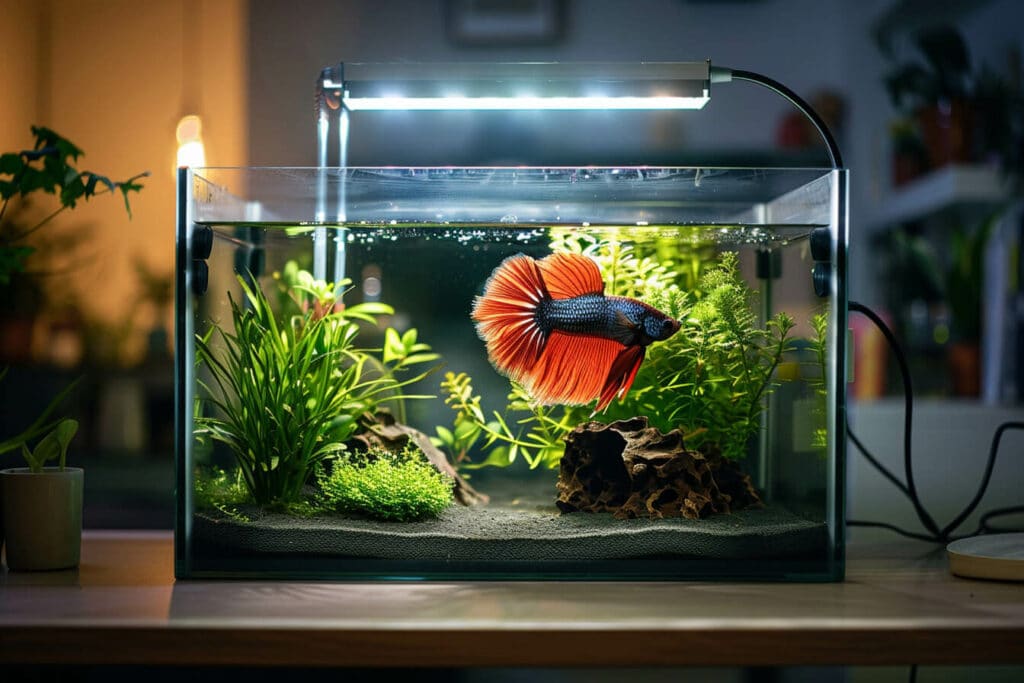
Comes with essential items like a heater, power filter, and LED lighting, making it an ideal choice for beginners.
Related articles:
The Ultimate Lighting Guide Setup For Betta Fish
Creating the ideal lighting setup for your betta fish involves more than just selecting the right bulb, it’s about considering the entire ecosystem of your aquarium. From tank placement to the types of lights and even the decorations you choose, each element plays a part in creating a comfortable and stimulating environment for your betta.
Here are some suggestions to help you achieve the best lighting setup:
- Tank Placement: Start with positioning your tank in a spot that receives indirect natural light. This ensures your betta benefits from natural light cycles without the risks associated with direct sunlight, such as excessive algae growth or water overheating.
- Selecting the Right Light Type: LED lights are the gold standard for betta tanks due to their energy efficiency, low heat emission, and ability to mimic the full spectrum of sunlight. Look for adjustable LEDs that allow you to customize the intensity and color of the light, catering to the specific needs of your betta and any live plants in the aquarium.
- Incorporating Tank Decorations: Decorations aren’t just for aesthetics; they play a crucial role in replicating the natural habitat of betta fish. Include plants (both live and artificial), rocks, and caves to create shaded areas within the tank. These not only provide hiding spots for your betta but also help diffuse the light, preventing overly bright spots that could stress your fish.
- Managing Tank Reflections: Reflections inside the tank can confuse and stress betta fish, leading them to believe another fish is invading their territory. To minimize this, ensure your tank’s background is non-reflective, and consider placing plants or decorations along the sides of the tank. Additionally, balancing the light inside the tank with the room’s ambient light can help reduce reflections that provoke aggressive behavior in bettas.
- Regular Monitoring and Adjustment: Even with the perfect setup, it’s important to observe your betta’s behavior and adjust the lighting as needed. Some bettas may prefer dimmer environments, while others thrive in brighter settings. Monitoring your fish’s behavior is key to providing the best care.
By considering these factors, you can craft a lighting setup that not only showcases the beauty of your betta and their home but also supports their health and well-being.
A thoughtfully lit tank can transform your betta’s living space into a sanctuary that closely mirrors the natural environments these fascinating creatures have evolved to thrive.
What Color Light Do Betta Fish Like?
The Preference for Blue Light
Among the spectrum of colors, blue light often emerges as a favorite for betta fish. This preference is not arbitrary. In their natural habitats, the water bodies bettas inhabit often reflect the sky’s blue hues, creating a serene and natural environment. Blue light can mimic these conditions in an aquarium, providing a calming effect on betta fish. It’s gentle on their eyes and can make them feel more secure, reducing stress levels.
The Impact of White Light
White light, which is a blend of all the colors in the spectrum, closely mimics natural sunlight and is another good option for betta fish tanks. It can brighten up the tank, making it easier for you to observe your betta’s true colors and behaviors. However, it’s important to ensure that the white light is not too intense as it could potentially stress your betta. Adjustable LED lights that emit a softer white light can be a great choice, allowing you to find a balance that suits your betta’s preferences.
Avoiding Intense and Colored Lights
While experimenting with different colors might seem tempting, it’s crucial to note that intensely colored lights (such as strong reds or greens) can be overwhelming for bettas. These colors do not naturally occur in their environment in the form of constant, all-encompassing light and might cause confusion or stress.
Creating a Balanced Light Environment
The best approach to choosing the right color light for your betta fish is one of balance and moderation. Incorporating periods of blue light, especially during the evening as you wind down the day’s cycle, can help mimic the natural twilight bettas would experience in the wild. During the day, a softer, white light that replicates the bright but diffused sunlight of their natural habitat can keep your betta active and healthy.
Remember, the key is to observe your betta’s behavior with different light settings. Just like humans, every betta is an individual with unique preferences. Adjusting your lighting setup based on your pet’s response will ensure they’re not just surviving in their environment but thriving.
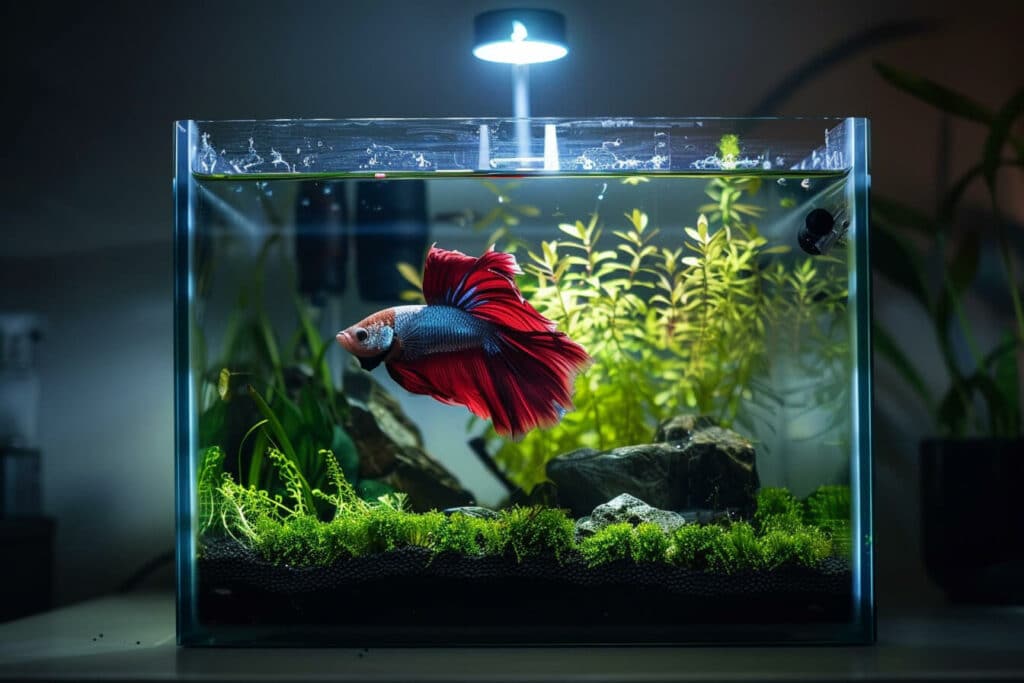
How Many Watts Should The Light Be For a Betta Fish Tank? ⚡
Determining the ideal wattage for lighting in a betta fish tank involves understanding the balance between providing enough light for visibility and plant growth, without overwhelming your betta with excessive brightness.
The wattage needed can depend on several factors, including the size of your tank, the type of plants you have, and the depth of the water. Here’s a guide to help you navigate the watts:
Aquarium Lighting General Rule of Thumb
A common rule of thumb for aquarium lighting is to aim for about 2 to 5 watts per gallon of water. However, this guideline is more relevant for tanks with live plants that require specific lighting for photosynthesis. For a typical betta fish tank, especially those without or with low-light-requiring plants, the lower end of this spectrum is often sufficient.
Betta-Specific Light Considerations
Betta fish do not require intense lighting to thrive. They prefer environments that mimic their natural habitat, which often includes shaded areas and dappled light. For a small betta tank (around 5 gallons), a light fixture rated around 1 to 1.5 watts per gallon can provide adequate illumination without causing stress. This ensures the tank is brightly enough lit to keep your betta active and healthy, while also promoting the growth of any low-light plants.
Adjusting to Your Tank Lights
The best approach is to adjust the lighting based on the specific needs of your tank and observe how your betta responds. Start with a lower wattage and gradually increase if you find it necessary, especially if you’re aiming to grow more demanding aquatic plants. Additionally, incorporating a dimmer or choosing a light fixture with adjustable settings can offer greater control over the light intensity, allowing you to create an ideal environment for your betta.
Conclusion: While the rule of 2 to 5 watts per gallon provides a starting point, betta fish tanks often thrive with less intense lighting. Opting for adjustable LED lights can give you the flexibility to create a comfortable environment for your betta, with the added benefit of energy savings. Remember, the goal is to create a balanced and stress-free habitat that your betta will enjoy.
5 Great Aquarium Light Solutions for a Betta Tank
Choosing the right light for your betta fish aquarium can significantly enhance your fish’s quality of life, as well as the overall aesthetic of their environment.
With the myriad of options available, it can be overwhelming to select the best one.
Here are some examples of good aquarium lights that cater to the needs of betta fish, ensuring they live in a well-lit, stress-free habitat:
- LED Aquarium Kits: Many modern aquarium kits come equipped with built-in LED lighting systems that are specifically designed for aquatic environments. These systems often feature adjustable settings for brightness and color temperature, allowing you to simulate natural daylight and dusk periods. An example is the Fluval Spec V Aquarium Kit, which offers a sleek design and energy-efficient LED lighting perfect for highlighting the vibrant colors of your betta.
- Adjustable LED Lights: For those who prefer more control over their lighting setup, standalone adjustable LED lights are a great choice. Products like the NICREW ClassicLED Plus provide a full spectrum of light, which is ideal for plant growth and enhancing fish colors. With adjustable brackets and multiple light modes, you can easily customize the lighting to suit your betta’s needs and your aesthetic preferences.
- Clip-on LED Lights: Clip-on LED lights offer a convenient and versatile lighting solution for smaller tanks. The Finnex Stingray Clip Light is an excellent example, offering a sleek design and a blend of white and blue LEDs. This type of light is easy to install and adjust, making it perfect for betta fish owners who are looking for a simple yet effective lighting option.
- Submersible LED Bars: If you’re aiming for a more dramatic lighting effect while ensuring your betta’s comfort, consider a submersible LED bar like the Aqueon LED Aquarium Light Bar. These lights can be placed at the bottom of the tank or behind a backdrop to create a beautiful, illuminated environment without overwhelming your betta with direct light.
- Smart Aquarium Lights: For tech-savvy betta owners, smart aquarium lights offer the ultimate convenience. Devices like the Current USA Satellite Freshwater LED Plus Light can be controlled via remote or smartphone app, allowing you to adjust the light’s intensity, color, and even program specific lighting schedules. This level of control ensures your betta fish experiences a naturalistic light cycle, mimicking their native habitat’s conditions.
When selecting an aquarium light, consider your tank’s size, the presence of live plants, and your personal preferences for day and night cycles. A well-chosen light not only beautifies your aquarium but also contributes to the health and happiness of your betta fish.
FAQ About Betta Fish Lighting
Q: Can Betta Fish Live Without Artificial Lighting?
A: Yes, betta fish can live without artificial lighting if they receive some indirect natural light. However, artificial lighting helps maintain a consistent light cycle and can enhance their color vibrancy and overall well-being.
Q: Is Blue Light Good for Betta Fish?
A: Blue light is often preferred for betta fish tanks as it can mimic their natural habitat and has a calming effect. It’s suitable for nighttime use as it doesn’t interfere with their sleep cycle.
Q: Can Too Much Light Stress a Betta Fish?
A: Yes, excessive light can stress betta fish, potentially leading to health issues. It’s important to provide a balanced light cycle with periods of darkness to mimic their natural environment.
Q: What Type of Aquarium Light is The Best for Betta Fish?
A: LED lights are ideal for betta fish tanks. They’re energy-efficient, emit low heat, and can be adjusted to replicate natural light conditions, making them suitable for supporting both betta fish and aquatic plants.
Q: How do I reduce tank reflections that might stress my betta?
A: Minimize tank reflections by ensuring the tank’s lighting is balanced with the room’s ambient light. Decorations and background covers can also help reduce reflections inside the tank.
Q: Can Betta Fish Sleep with The Light On?
A: Betta fish, like many living creatures, benefit from a natural light cycle, which includes darkness at night. Keeping the light on constantly can disrupt their sleep patterns and cause stress. It’s best to provide them with a period of darkness to mimic their natural habitat and support healthy sleep.
Q: Can I use a timer for my betta fish tank's lighting?
A: Absolutely! Using a timer is recommended to ensure a consistent light cycle for your betta fish. It automates the lighting schedule, providing regular periods of light and darkness without manual intervention.
Q: Can Bettas See in The Dark?
A: Bettas have limited vision in the dark. While they can’t see as clearly as they do in daylight, their lateral line system helps them navigate their environment by detecting vibrations and movement in the water. Providing a period of darkness is essential for their natural resting behavior.
Q: What Happens to Betta Fish without Light?
A: Constant darkness is not ideal for betta fish. Just like continuous light, it can lead to stress and health issues. Betta fish rely on light to regulate their biological clock, which affects their feeding, behavior, and rest. A balanced day-night cycle is crucial for their well-being.
Q: Do Betta Fish Need Light 24/7?
A: No, betta fish do not need light 24/7. Continuous light exposure can disrupt their natural sleep cycle and cause stress. A consistent cycle of 12-14 hours of light followed by 10-12 hours of darkness is recommended for their health and happiness.
Q: Why Does My Betta Flare Up Whenever I Turn The Bedroom Light Off?
A: Bettas are territorial and may flare up when they see their reflection, which can become more apparent with sudden changes in lighting. When you turn off the bedroom light and the tank light is still on, the glass can act like a mirror. Ensure a gentle transition of lighting in the tank to minimize reflections and reduce stress.
Inconclusion
We’ve journeyed through the illuminating world of betta fish care, exploring how the right lighting can make all the difference in your aquatic friend’s life. From understanding their natural preferences to choosing the best light fixtures, it’s clear that a little thought into lighting goes a long way in creating a happy and healthy home for your betta.
Remember, every betta is unique, and there’s no one-size-fits-all answer. Keep an eye on your betta’s behavior and adjust the light accordingly. With patience and care, you’ll find the perfect balance that brings out the best in your colorful companion.
Thank you for diving into the depths of betta fish lighting with us. Your dedication to providing the best for your betta not only reflects your love for them but also enriches their world in countless ways. Here’s to bright days and comfortable nights in your betta tank!
If you have any questions, stories, or tips you’d like to share, we’re all ears! Join the conversation and let’s continue learning together. Happy fishkeeping!

Delighted to have you here at BettaReef! This place is a treasure trove of knowledge about Betta fish, Betta Care, Health, Gear, and much more from the wonders of aquatic life. My journey in this fascinating world began when I was just 8, and now, as a seasoned hobbyist, I’m here to help fellow Betta enthusiasts create a thriving Betta environment for a healthy life.
I’m committed to delivering high-quality content, backed by a stringent editorial process. Each product review is based on real-life usage and practical analysis, ensuring that you get insights and advice that truly matter.
Related Blog Posts:
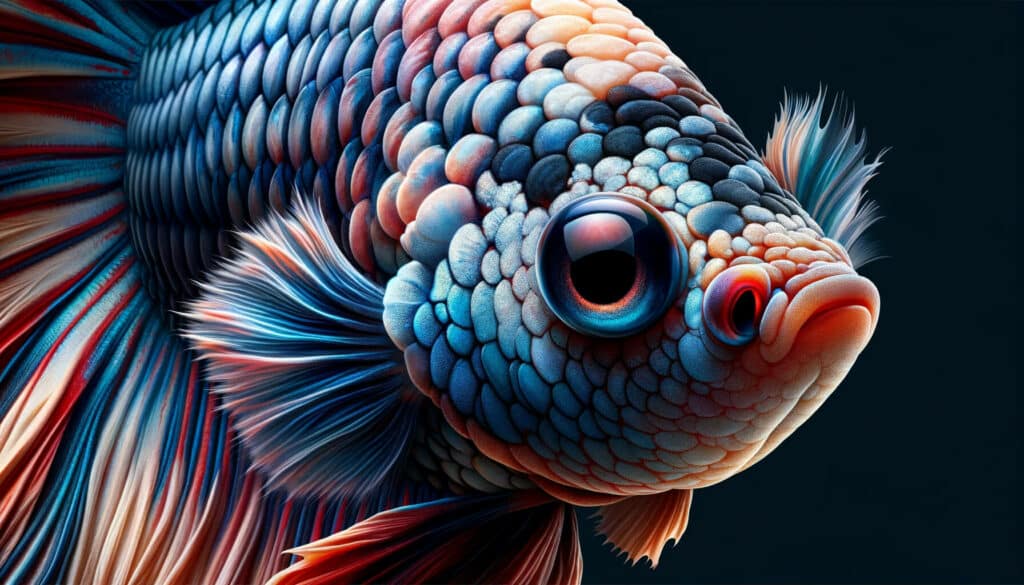
Can Betta Fish See In The Dark?
Swim To 🤿 Home Can Betta Fish See in The Dark? “Can betta fish see
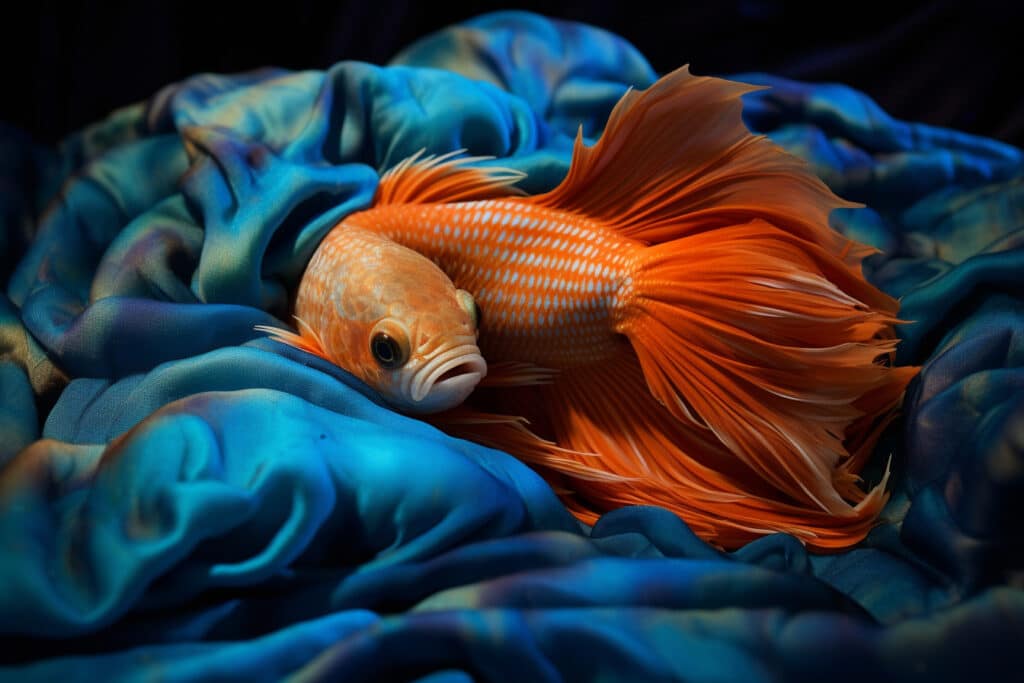
Do Betta Fish Sleep
Do Betta Fish Sleep? Do Betta Fish Sleep? Or are they just taking a quick
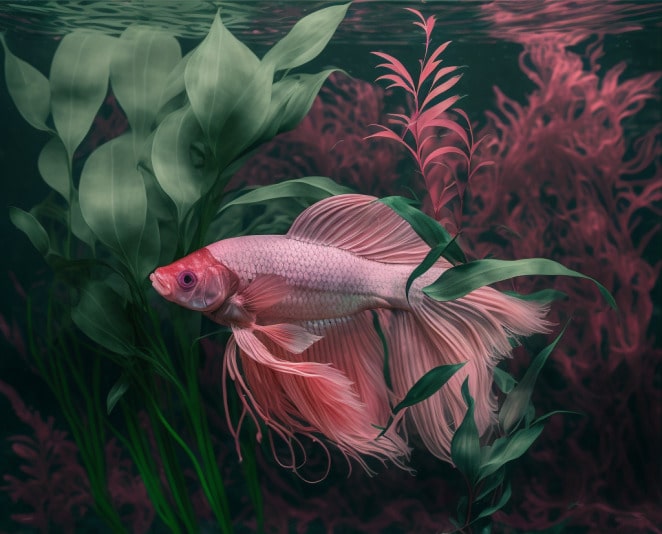
The Best Betta Fish Tank Setup Guide In 2024
The Best Betta Fish Tank Setup Guide In 2024 Find the perfect Betta fish tank

